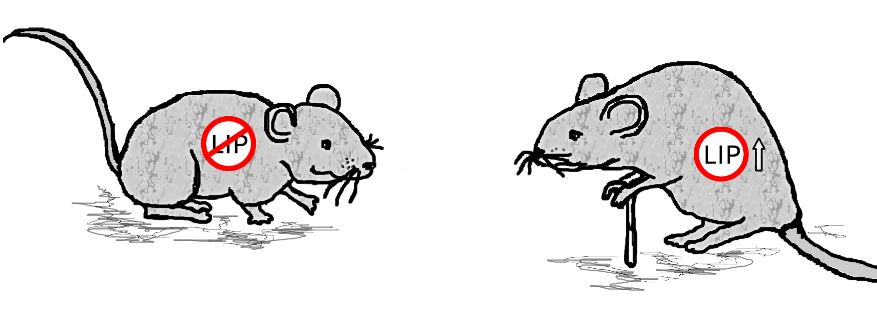We're not going to wean human babies on a starvation diet and then expect them to do it for 110 years. They will discover In-N-Out Burgers somewhere along the way.
But while aging is going to remain the biggest risk factor for diseases like cancer, cardiovascular diseases, type II diabetes and Alzheimer's disease, obesity will soon overtake smoking as the number two. What can bridge the gap between humans and the flies, worms, fish and mice that have benefited from a lifetime diet?

The C/EBPß-LIP gene regulator is involved in the aging process. If LIP is missing, the lifespan of mice increases and physical fitness is maintained during aging; without a calorie restriction. [Figure: Kerstin Wagner / FLI] (217)
The answer may be how the protein complex mTORC1 uses the gene switch C/EBPß to control the metabolism of mice: C/EBPß can occur in a short variant (LIP) and a long variant (LAP). A high activity of mTORC1 leads to an increased formation of the short (LIP) variant. The activity of mTORC1 is regulated by food intake and can be significantly reduced by a calorie-restricted diet, which in turn inhibits the formation of LIP.
Females only
If the production of the short LIP variant is permanently suppressed in a mouse strain developed by the researchers, the result is a healthier metabolism with reduced body weight and improved insulin sensitivity. These LIP-reduced knockin mice showed improved metabolic health, similar to mice under calorie restriction, although the LIP-reduced mice were not on such a diet.
LIP-reduced mice developed less cancer later in life than control mice and that was one factor in living about 20 percent longer. Except it was only in females. The study used a specific knockin mouse strain but other studies about calorie restriction also show better outcomes for females, with no real explanation for that.
Citation: Müller C, Zidek LM, Ackermann T, de Jong T, Liu P, Kliche V, Zaini MA, Kortman G, Harkema L, Verbeek DS, Tuckermann JP, von Maltzahn J, de Bruin A, Guryev V, Wang ZQ, Calkhoven CF. Reduced expression of C/EBPβ-LIP extends health- and lifespan in mice. eLife. 2018, Apr 30, 7. pii: e34985. doi: 10.7554/eLife.34985.





Comments